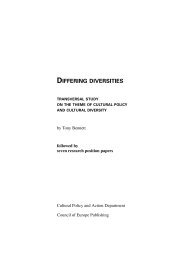Why we need European cultural policies: the impact of EU ...
Why we need European cultural policies: the impact of EU ...
Why we need European cultural policies: the impact of EU ...
You also want an ePaper? Increase the reach of your titles
YUMPU automatically turns print PDFs into web optimized ePapers that Google loves.
Following <strong>the</strong> <strong>EU</strong> principle <strong>of</strong> `complementarity’, some <strong>of</strong> <strong>the</strong> rules designed to achieve such policygoals could still be implemented at <strong>the</strong> level <strong>of</strong> member states. The difference would be that <strong>the</strong>rewould be a clear responsibility, at <strong>EU</strong> level, not only to support <strong>the</strong>ir national cultures but also toinvest in more balanced exchanges within <strong>the</strong> <strong>EU</strong>. Indirectly, this would ease <strong>the</strong> pressure on <strong>the</strong><strong>EU</strong> budget. It would also be likely to make future <strong>EU</strong> funding programmes more effective as <strong>the</strong>irobjectives would be based on a <strong>we</strong>ll-established and articulated policy.There are at least two major obstacles to a more proactive approach towards <strong>cultural</strong> policymakingin <strong>the</strong> <strong>EU</strong>. First is Article 151, with its explicit exclusion <strong>of</strong> culture from any harmonization<strong>of</strong> <strong>the</strong> member states’ laws and regulations. This is a barrier, despite various interpretations <strong>of</strong> <strong>the</strong>legal value <strong>of</strong> <strong>the</strong> exclusion and <strong>the</strong> claims <strong>of</strong> some authors that <strong>the</strong> legal strength <strong>of</strong> <strong>the</strong> Article151 is overestimated. (Pau<strong>we</strong>ls 2003; Niedobitek 1997)The second obstacle is a lack <strong>of</strong> political will for such a shift. This is highly controversial, and givencurrent developments in <strong>the</strong> <strong>EU</strong> it is really hard to imagine any such a shift in <strong>the</strong> near future.For <strong>the</strong> new member countries and candidate countries, still in <strong>the</strong> middle <strong>of</strong> fundamental changesand searching for models to adapt <strong>the</strong>ir <strong>cultural</strong> markets to <strong>the</strong> new requirements, lack <strong>of</strong> a morearticulated <strong>cultural</strong> policy means that <strong>the</strong>y will have to rely almost exclusively on <strong>the</strong>ir own policysolutions, without much guidance. Had <strong>the</strong>re been a more proactive <strong>European</strong> <strong>cultural</strong> policy,it would have helped move culture higher on <strong>the</strong> policy agendas <strong>of</strong> <strong>the</strong>se countries because,as pointed out by one <strong>of</strong> <strong>the</strong> respondents to my questionnaire, national priorities are very muchshaped by those formulated in Brussels. While `old member states’ have a much longer tradition<strong>of</strong> balancing <strong>cultural</strong> and economic aspects <strong>of</strong> culture, <strong>the</strong> <strong>cultural</strong> sector in transition countrieshas had to deal with <strong>the</strong> transitional crisis, including requests for rapid privatization in <strong>the</strong> <strong>cultural</strong>field and restructuring, at <strong>the</strong> same time as it has been having to fight for <strong>the</strong> survival <strong>of</strong> basic<strong>cultural</strong> infrastructure.Despite such difficulties, all <strong>the</strong>se countries have started to build functional <strong>cultural</strong> markets,depending on <strong>the</strong>ir specific circumstances. As with <strong>the</strong> World Trade Organization negotiations,it is important to monitor developments in Brussels to ensure that adequate <strong>policies</strong> are put intopractice and that <strong>cultural</strong> aspects do not lose out as <strong>the</strong> logic <strong>of</strong> <strong>the</strong> economy and free markettakes over.On <strong>the</strong> o<strong>the</strong>r hand, full membership <strong>of</strong> <strong>the</strong> <strong>EU</strong> has created an opportunity for <strong>the</strong> new memberstates to fully participate in <strong>the</strong> decision-making process and to put pressure, where necessary,to get some <strong>of</strong> <strong>the</strong>ir priorities onto <strong>the</strong> agenda. It has also opened up yet ano<strong>the</strong>r channel forknowledge and experiences to be exchanged; this can benefit culture even if it is not a result <strong>of</strong> adeliberate <strong>cultural</strong> policy.Following <strong>the</strong> logic <strong>of</strong> UNESCO’s 2005 Convention73














